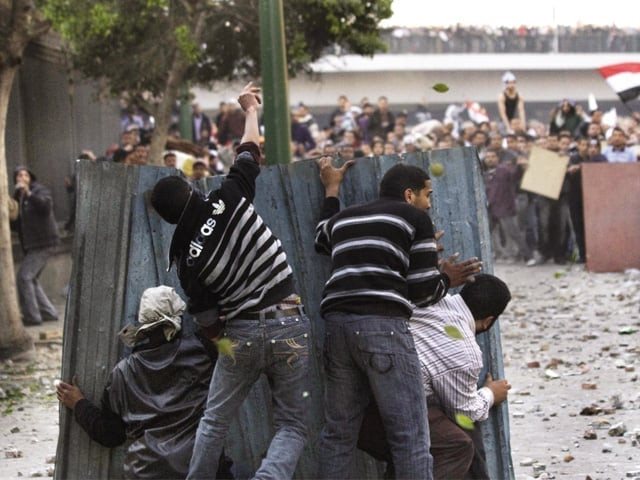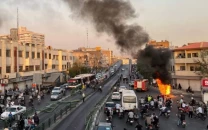Egypt unrest: Pitched battles at Tahrir
Street battles between supporters and detractors of Mubarak; VP says no negotiations until anti-govt protests stop.

According to media reports, supporters from both sides threw stones and battled with sticks and fists, in the clashes that broke out early afternoon and were continuing after sunset.
Tension had been rising from early morning when President Hosni Mubarak’s supporters began staging their own rallies around Cairo, saying the president represented stability amid growing insecurity, and branding as “traitors” those who want his departure.
“There are members of the police in civilian clothing, posing as pro-Mubarak protestors, who are chasing us with rocks, bricks, and Molotov bombs,” said one protestor who was still at Tahrir
On Tuesday night, Mubarak addressed the nation stating that he will not seek re-election in September 2011 and will do what is necessary to implement reforms for the remainder of his term.
Some protesters were satisfied, but not all. For example, an anti-Mubarak protestor, who asked to remain anonymous, remained in Tahrir. “Some protesters said we have achieved our purpose and went home. But we’re not satisfied, so we’ve stayed.” They want Mubarak to leave and Omar Suleiman to be the interim President until elections.
However, on Wednesday, pro-Mubarak protestors flooded into the Square and clashes broke out between them and the anti-Mubarak camp.
Opposition figurehead Mohamed ElBaradei, a Nobel Peace laureate, called on the army to intervene to stop the violence, the worst in the nine-day uprising. But troops stood by and watched as the tumult raged. Media reports put the number of injured at 500 and even reported a death. Urging protesters to go home, the armed forces told them their demands had been heard.
Sally El Sabbahy, also a Cairo resident, said she admired the protestors’ courage, but was tired of the protests taking the country “hostage.” She added that they must not regard Mubarak’s speech as a loss “just because he is still president because they got him to admit that things have to change. At this point, it’s a priority for people to look back at their country and at themselves and restore the natural order of things.”
For now, Cairo remains in a surreal state of disarray; there are military tanks positioned around the city and helicopters constantly circling the skies.
The country’s economy will be affected gravely; but the general hope is that Egypt will be able to build itself back up, and soon – stronger and more dynamic.
Meanwhile, Vice President Omar Suleiman said anti-government protests must end before talks with the opposition can start.
A brief recount
The “Day of Anger” (January 25) marked the beginnings of what some have dubbed the “Egyptian Revolution;” inspired by Tunisia, a group of young Egyptians went to the streets to demand rights peacefully. The day’s protests were relatively calm considering past demonstrations in Egypt, although towards midnight, clashes had begun between police and demonstrators.
What followed in the next few days were a prelude to Friday, when protestors “promised” a larger, more intense protest.
Following Friday prayers, Cairo’s skies clouded with tear gas and its downtown square, Midan Tahrir, was filled with chaos as thousands, chanting against the regime, clashed with police.
The day’s events were quickly spiraling out of control. The ruling National Democratic Party’s Cairo headquarters were set ablaze and remained so for four hours before anyone started to put it out; Egypt’s 1.25 million police force had disappeared from the entire country; essentially, they abandoned ship.
Looters began robbing banks, restaurants, stores, and households nationwide. A curfew was imposed and widespread panic ensued as the military was supposedly moving in. Civilians began guarding their homes; they organised traffic in the absence of policemen and cleaned the streets.
Mubarak finally addressed the nation, stating that the government would be dissolved. Protestors were not satisfied.
The following days witnessed continuous curfews, looting and gunshots throughout the night, and a rising death toll.
The only thing that kept Iman Dawood, a Cairo resident, feeling safe were the neighbourhood watch groups; young men stood protecting their families and properties. She said, “although we were very frightened, it was inspiring to see residents come together to protect one another. This incident really restored my faith in Egyptians.”
In the coming days, the protestors stayed in Midan Tahrir, while the president appointed intelligence man Omar Suleiman as Vice President and military man Ahmed Shafik as Prime Minister. The Vice President told the nation that he was appointed seek dialogue with the opposition.
But anarchy was still ruling the nation. Reports also came that thousands of prisoners had escaped from unguarded prisons all over Egypt.
By Sunday, January 30 evening, the military had reached most places in Cairo and were mobilising throughout the country.
With additional input from agencies
Published in The Express Tribune, February 3rd, 2011.



















COMMENTS
Comments are moderated and generally will be posted if they are on-topic and not abusive.
For more information, please see our Comments FAQ